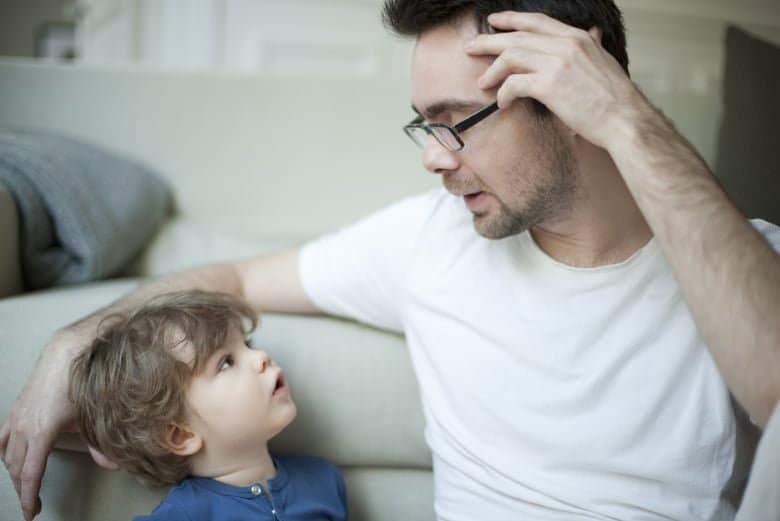Looking for childcare? Find help in your area here.
Whether your child is afraid of getting the flu shot or has been coming down with one bug after the next, contending with cold and flu season as a parent is always a challenge. Now, families’ concerns are elevated, thanks to the spread of coronavirus—also referred to as a novel (new) coronavirus, or SARS-CoV-2—across a growing number of countries.
Since this virus is in the family of viruses that cause the common cold, it’s likely that healthy children and adults will resolve the illness on their own and recover without any problems. Still, children are sure to see stories that make them worry about the spread of the latest contagious bug. However, while feelings of stress and anxiety are normal, you’ll want to allay your child’s fears and concerns. Overall, it is important to talk with your children regarding what is going on, as they may be seeing social media or other media discuss this outbreak.
Here are some strategies for talking to children about coronavirus, according to experts:
1. Strive for age-appropriate communication
Pre-schoolers
Experts say that lively terms like “germs” or “bugs” work well for young kids. They also respond well to pictures of the virus under a microscope, which help them wrap their heads around something that’s otherwise blind to the naked eye.
Use very concrete language, like how “spit” can cause germs to pass to one person or the next. Then emphasize that the best way to not let those germs get into your own body is to wash them off before you touch your food or your face. That might sound something like, “Leo, remember when you got really sick and threw up and couldn’t eat for days? That’s because you got a bad germ from someone else. We can’t see those little bugs, but we can keep our bodies healthy by washing our hands.”
School-age kids
This age group is much more aware of the body, and they are motivated to please their parents and to get rewards. Positive reinforcement can go a long way with this age group, so be sure to recognize healthy behaviours. In other words, your fifth-grader will respond well to being praised for washing his hands or coughing into his elbow instead of his hands.
Teens
You really want to enable them to take care of themselves independently. Avoid anything that could be interpreted as lecturing. Instead, ask them questions, give them the chance to ask questions and, in general, strive for a back-and-forth discussion about the virus and prevention. This can lead to a lot more engagement and learning.
2. Talk about preventing infection
Experts say: The virus is thought to spread mainly from person to person—between people who are in close contact with one another (within about 6 feet), through respiratory droplets produced when an infected person coughs or sneezes. These droplets can land in the mouths or noses of people who are nearby or possibly be inhaled into the lungs. The virus is also spread from contact with infected surfaces or objects.
Discuss everyday ways transmission can occur, like kissing or sharing cups or utensils or personal care items. Then, you can pivot to the fact that preventing COVID-19 can be done effectively with the same measures as done for other common cold and flu viruses. Teach your kids to wash their hands, especially after toileting, coughing and sneezing and before eating or touching their mouth, nose or eyes. These lessons can have a positive effect on kids’ emotional health: Children thrive when they feel empowered, and by giving them these tools, they will feel more secure.
3. Set concrete hygiene rules and regimens
Take advantage of this moment to instil healthy behaviours, particularly with preschool-age kids. For instance, you can set ground rules like “We never eat without washing our hands!” or “We always wash our hands with soap and water after using the bathroom.”
And actions are just as effective as words, especially if your child is younger. Pre-schoolers learn by doing and practicing, so taking time to practice healthy habits together is very important.
4. Check your own sources
Ensuring you’re getting accurate information from trustworthy sources can benefit the conversations you have with your child. Get the latest update on coronavirus prevention here: www.health.gov.au/news/health-alerts/novel-coronavirus-2019-ncov-health-alert.
5. Address racial profiling
Knowledge that the novel coronavirus was first detected in Wuhan City in the Hubei Province of China has led to several reports of events where people of Asian descent were ostracized or bullied due to suspicions of coronavirus. For that reason, experts urge parents to discourage adolescents and young adults from profiling certain groups out of fear. Practice what you preach—as your child may take a comment you made very seriously.
6. Discuss quarantines or school closings with care
If your child or family is under quarantine or your school is closed, you should tell your children that if they catch the coronavirus, it will not be a serious disease, it will be just like having the flu. However, out of the need for public safety, the people in charge have closed the schools and/or the after-school activities, so as not to spread germs.
7. Model healthy emotional coping
Experts encourage parents to model effective coping for kids who might be struggling to deal with their own troubling feelings, like fear or anxiety. Parents should avoid appearing overwhelmed by the spread of coronavirus, as children are sensitive to parental anxiety. But let the children know that it is alright to be upset and allow them the space to own and talk about their emotions. Then, simply discuss the action steps you’re taking. Acknowledge the issue as one you are monitoring and working to prevent any problems.
If you feel overwhelmed and/or hopeless, experts advise looking for support from other adults before reaching out to your child.
Looking for childcare? Find help in your area here.
